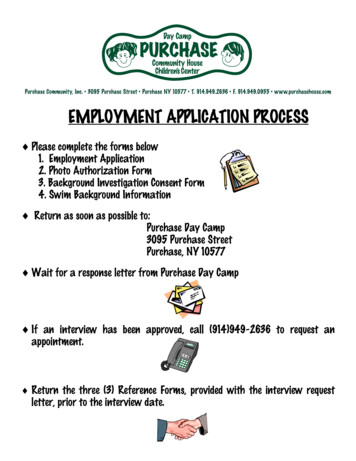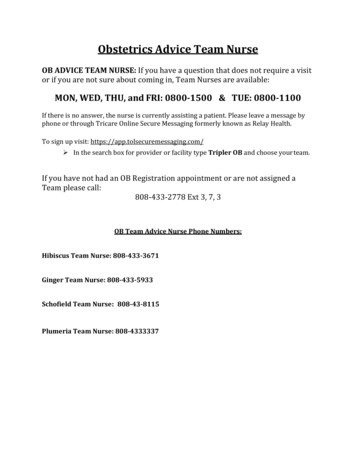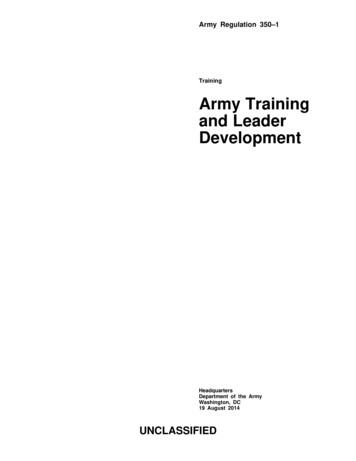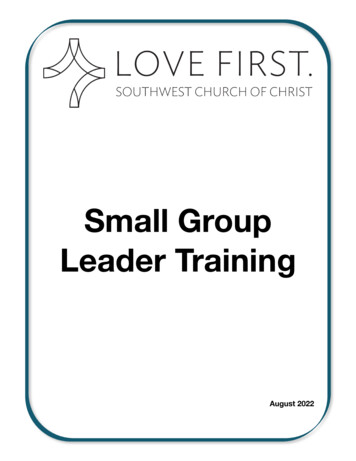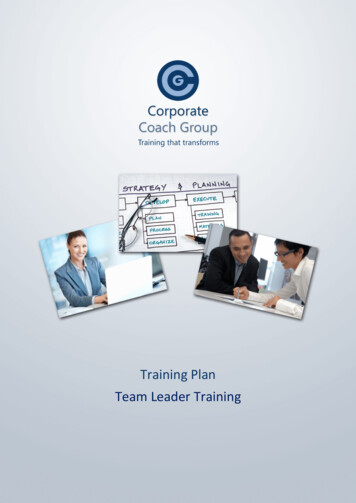
Transcription
Training PlanTeam Leader Training
Training PlanTeam Leader TrainingA Training Plan for Your OrganisationWhat is the purpose of the training?The purpose of the training is to initiate a process of rapid improvement, by means ofachieving a shared understanding of the correct knowledge and skills that we need to employ,if we are to achieve our stated goals.Team Leader Course SummaryTeam leaders often manage on “the front line” of service delivery. Therefore, their role is vitalbecause your organisation stands or falls on the ability of the team leader to get the job done,on time, on budget and to the right standard.This interactive and practical two-day training programme will give your team leaders all theessential leadership skills they need, including goal setting, effective communication,prioritisation, planning, conflict management, self-confidence and the ability to inspirepositive emotions in others.Learning Outcomes for the Team Leader Course Master all the essential team leader skillsHow to set and achieve valuable goalsInspire the team to give you their best effortsCommunicate with more clarity and greater confidencePlan, prioritise and delegate more effectively and accelerate your progressQuickly handle difficult people and tricky conversations with the correct amount ofassertivenessDevelop more assurance, control and self-confidence based upon a solid foundation ofknowledgeCustomer Review“A good spread of practical and relevant subjects. Good use of practical application. Itwas all beneficial. The presentation was very engaging, entertaining and thoughtprovoking. Great use of real wold examples and stories to back up theory. Also willingto coach a little on personal issues relevant to the course.Wayne RobshawMobysoft LimitedPage 2
Training PlanTeam Leader TrainingTeam Leader Training Course OverviewThis course covers the major skills needed by all team leaders. Including:Self-awareness: Before a leader can affect anyone, they must first be able to positively affectthemselves. So, we begin the course with some “self-assessment”, where delegates discusstheir strengths and where they think they need to improve.Create and sustain a positive mental attitude: Team leaders must be able to inspire positiveemotions in themselves and others. We show your team leaders how attitude affects results.Performance management: Team leaders must know how to give constructive feedback tocolleagues. Feedback is a key concept on this course, and your team leaders will return fromthe course as experts.Prioritisation and planning: Team leaders must ensure that the right things are done at theright time. So, prioritisation and planning are key components of this course.Effective Communication: Leaders must eliminate confusion and error caused by poorcommunication. We show delegates how to communicate with clarity.Setting and achieving goals: The missions of your team leaders, is to achieve goals. Therefore,we emphasise the power of goal setting.Customer Review“Tremendous course! Highly recommended at all levels in an organisation. Verygood tools and techniques that are easy to apply at work and at home. Willchange my outlook entirely! Chris is excellent. A very inspiring trainer, has madea real difference in my outlook in my career and given confidence to lead myselfand others.Jane CrossAPD CommunicationsPage 3
Training PlanTeam Leader TrainingTeam Leader Training Course DetailsDay 1 - MorningWhat is the purpose of Team Leader training?The purpose of this Team Leader training is to equip you with a set of techniques andcommunication skills, that will allow you to be more successful in your role as a team leader.In order to be successful, you must master the following six team leader skills:1.2.3.4.5.6.Clarity of purpose - goal focusClear communication and accurate languageTime management and delegating skillsRational conflict management skillsHow to inspire and motivate yourself (personal management)How to inspire and motivate other people (leadership qualities)Goal focus for Team LeadersSuccess means the achievement of a goal. Therefore, a clear goal focus is the most importantquality of the successful Team Leader.How Team Leaders can communicate the goalThe goal must be clearly communicated to every member of the team, so that everyoneunderstands what is required.Any ambiguity, or misunderstandings, will cause confusion and error. Therefore, TeamLeaders must master the skill of accurate language.Page 4
Training PlanTeam Leader TrainingHow Team Leaders should use SMART targetsAsk eight questions that relate to your goals and how you can achieve them.SMART targets suggest the following eight questions:1.2.3.4.5.6.7.8.What is the goal you need to achieve?How do you specify that goal using numbers?How do you specify that goal using words?How would you measure progress?What abilities do you need to improve?What resources do you need to acquire?What is the time limit?Is that limit reasonable or over-optimistic?Exercise: Develop your skills by practicing with a real-life example.How Team Leaders can make the right impressionEvery day, you leave impressions in the minds of other people.How do you want to be perceived by the people in your team?What impression do you want to leave?What team leader and personal qualities do you want to be known for?Exercise: Develop your skills by doing a practical example of "Impression management".Clarity of Purpose is the starting point of all achievement.How the Team Leader should use humour at workA good sense of humour is important.How can humour work add value to yourself and the rest of the team?How have you seen the misuse of humour cause problems at work?The correct and incorrect use of humour in the workplace.Exercise: Develop your skills by practicing with real-life examples.Page 5
Training PlanTeam Leader TrainingClear and accurate communication for Team LeadersTeam leaders must know how to communicate their message with clarity and accuracy. Thereshould be minimal chance of misunderstanding.Team Leaders must not give any vague instructions. They must be able to define theirmessage and always be able to explain precisely what they mean.Exercises: Develop your skills by practicing a real-life example.Team Leaders should give only affirmative instructionsAffirmative instructions mean talking about what you CAN do, i.e. the can-do portion of thejob.Negative instructions mean talking about what you CANNOT or WON’T do, i.e. the NO-CANDO portion of the job.Team Leaders must talk about the can-do portion of the job.Practice exercises in turning the conversation from the negative to the affirmative.The use of embedded commands by Team LeadersWe influence each other by the way we speak. Sadly, some people emit too many negativevibes. For example, the phrase: “Don’t worry” is a suggestion to worry.Good Team Leaders are conscious of using only affirmative language.Exercise: Develop your skills by practicing with examples.Page 6
Training PlanTeam Leader TrainingDay 1 - AfternoonConflict Management Training for Team LeadersNever attack a person's character as you will trigger a negative emotional response.On this course delegates will learn how to verbalise conflict messages correctly by being morefactual, objective and specific, without becoming emotional and opinionated.You will learn the difference between objective and subjective language, and why, when inconflict, you should only use objective language. Tell them precisely what is wrong, in nonemotional, factual terms.Use reason to resolve conflict, not avoidance nor high emotion.Use logic to resolve conflict; not anger, upset or too much emotionAs a Team Leader, how you handle conflict is important. You need to know exactly how to: Use logic to resolve conflict; not anger, upset or too much emotionResolve a conflict quickly; before it escalates into something more damagingWhen you should compromise, and when NOT to compromiseTeam Leader conflict management skillsNever attack a person's character. If you attack their character, you will trigger a negativeemotional response. You will learn how to verbalise conflict messages correctly.Be more factual, objective and specific, try not to become emotional and opinionated.Learn the difference between objective and subjective language. When in conflict, use onlyobjective language.Tell them precisely what is wrong, in non-emotional, factual terms.Suggest a way out of the conflict situation. Suggest a corrective action.Distinguish between reasons and excuses for not doing something: have a different policy foreach.Know when to give ground and compromise and when to NOT compromise.Exercise: Develop your skills by practicing real-life conflict examples.Page 7
Training PlanTeam Leader TrainingDay 2 - MorningTeam Leader time management skillsTime management is the art of making the maximum progress in the minimum time andeffort.Time management is about organising yourself and your team, so that they are always doingthe right things, in the correct order.Good time managers do not necessarily do the easiest things first. They do the most valuablethings, in the most logical order.Team Leaders use "Task deadline" and "Task value" as key indicatorsTeam Leaders do things in the right order: Q1 Crisis: High value, late workQ2 Productive: High value, preparation, prevention and planningQ3 Busy: Low-value busy-workQ4 Fruitless: Waste of time activity. GossipDistinguish between being "Busy" and being "Productive".The Team Leader's most hated enemy is the “busy but non-productive day”.Have you ever had one?Page 8
Training PlanTeam Leader TrainingHow to manage Time WastersTeam Leaders do battle with these three-time wasters: Self; Others; Systems (SOS).1. Your own bad habits: How you mess-up your time management2. Other people: How other people mess up your day3. Poor systems: inefficient systems within your organisationHow to limit the damage done by SOS.Time Tips for Team LeadersOur time management questionnaire will discover exactly how you could improve your timemanagement.Team Leader Delegation SkillsDelegation is the art of entrusting a task to another.Reasons to delegate.How to delegate a task.The common errors to avoid.Prioritisation skills for Team LeadersYou can’t do everything simultaneously, therefore you must prioritise.Prioritisation is the science of putting things into the correct order.Manage your priorities by means of a decision matrix.The power of an idea lies in its application.Page 9
Training PlanTeam Leader TrainingDecision matrices for Team LeadersDecisions fall into the following six categories; each type has its own decision matrix. Prioritisation by valuePrioritisation by logical sequenceYes or No binary decisionWhich one, or what kind?Problem - cause – solutionProblem – implication – countermeasureThe advantages of using a structured approach to decision making.How Team Leaders can manage interruptionsManage interruptions by means of the 80-20 principle.The 80-20 principle suggests that 80% of the value of their message is contained in only 20%of the content.Your task is to discover the 20% of their message that contains all of the value.Interrupt the interrupter.Emails: How to best manage themEmails can be a distraction. We will analyse how you can best manage them to minimise theproblem.Page 10
Training PlanTeam Leader TrainingDay 2 - AfternoonLeadership Skills for Team LeadersEmotional management.Positive mental attitude.Mindfulness.The attitude of the team has a profound effect on the results the team is able to achieve.The Team Leader’s role includes creating and sustaining a positive mental attitude, especiallyduring tough times.Every problem contains the seed of an equivalent, or a greater benefit.Your task is to find it.Positive mental attitude techniquesImprove your understanding of how you can affect the emotions of others and how to instil inthem a more positive outlook.Understanding the principles of Emotional intelligence (EQ).Learn how to avoid accidentally demotivating staff.Team Leaders must master the skills of conversation controlEverything you say to your team influences how they feel. And everything they say to eachother influences how they feel. Often, work conversations result in negative emotions, whichthen act to hamper progress.“Conversation control” is about listening to the emotional component of work conversationsand, whenever necessary, changing their content so that the emotions are, for the most part,positive.Page 11
Training PlanTeam Leader TrainingTeam Leaders learn to apply the success formulaAll successful action can be described by a simple five-part formula.1.2.3.4.5.Clear goal – PurposeFormulate your best plan in writingTake consistent actionGather and evaluate the feedback, both positive and negativeMake progress by continually adapting and evolving the planWhy Team Leaders should give properly worded feedbackThe valuable role of constructive feedback.How to ensure your negative feedback is seen as a constructive communication.Team Leaders - Final SummaryHow will this Team Leader management training course help you to get the best from yourselfand others?Personal action plan for Team Leaders.Page 12
Training PlanTeam Leader TrainingCustomer Review“Very good, targeted at right level. Interesting and applicable to working here. Wellstructured through both days. Good blend of humour, interaction and review. Materialgood quality and useful for reference. Chris was very professional, knew the subjectmatter and made the course very enjoyable. Thanks 99/100 :)Ian HaywardThe Heart of England ForestPage 13
Training PlanTeam Leader TrainingTraining Costs / InvestmentBespoke In-House or Live-Online Course 2,000 VAT per training dayPlus, hotel accommodation for trainer if needed (Premier Inn type: not the Hilton!)(International Price Varies)In-House training has been designed to provide a similar experience to our open courses,however we can tailor the content to fit your specific needs.We are able to train in your timezone.All our training includes: Two full days of quality training, delivered by an experienced trainerTotal of 12 CPD training hours (usually 9am - 4.30pm), plus an additional 2-3 via postcourse online independent learningFull digital interactive course notesTraining certificateAccess to additional free training material after the course via our post-course portal3 months free telephone coaching: Whilst you are implementing what you havelearned, if you need to, you can contact us for support and guidanceWe suggest the following plan of action:Please send to us:1. Any amendments or changes you wish to make to the programme.2. Your thoughts.3. The next step you would like us to take.Thank you.Corporate Coach Training LtdWalcot HouseParton RoadChurchdownGloucestershireGL3 2JJEmail: lindsey@corporatecoachgroup.comTel: 44 (0) 1452 856091Page 14
Training PlanTeam Leader TrainingCustomer Reviews“I really enjoyed this course. The trainer was fantastic, very positive energy andextremely engaging and knowledgeable. The printed training book had goodvisuals and wording; it was easy to understand. The course covered all therelevant topics, nothing was unnecessary. I learned a lot over the two days andhave already been able to put some of those skills into practice. I did comeaway feeling more confident.Joanne CookQ-Lab Europe LTD“I found the course to be extremely detailed and we were able to cover a lot in avery short space of time without being overwhelmed due to the well-structuredcourse. I enjoyed the role plays and learning about all of the different models very informative! Well-structured, easy to follow and very interesting! Lots ofdifferent techniques for learning which kept it stimulating. 100/100Nicole PetersThe Heart of England Forest“Very informative and constructive, carefully planned out presentations. Welltimed breaks and a very clear message and objective for each subject. Iespecially found the time management and planning very beneficial, as well asthe SMART and wrong box/right box techniques. This course has not onlybenefited me as a manager, but also helped me improve as a person. Alison wasa very knowledgeable and informative presenter, clearly understanding eachmember need to be there. An absolute credit to her profession.Alex HeadThe Monro Group - Openmouth Ltd“I found the course very informative. It helped me recap on management degree.Highly recommend course. The trainer was very knowledgeable on the subjectarea. Great pace of training and gave opportunities to raise or discuss areas wewanted too. Strong, knowledgeable trainer.Kim McCreadyTaurus HealthcarePage 15
Training Plan Team Leader Training Page 3 Team Leader Training Course Overview . This course covers the major skills needed by all team leaders. Including: Self-awareness: Before a leader can affect anyone, they must first be able to positively affect themselves. So, we begin the course with some "self-assessment", where delegates discuss



